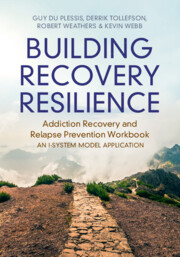 Building Recovery Resilience
Building Recovery Resilience Book contents
- Building Recovery Resilience
- Building Recovery Resilience
- Copyright page
- Contents
- Introduction
- 1 Dealing Effectively with High-Risk Situations
- 2 Coping with Cravings and Triggers
- 3 You Can’t Fix What’s Not Broken
- 4 Break the Addiction Cycle
- 5 The Requirements That Bind Us
- 6 Your Recovery Resilience Practice
- References
- Notes
- Index
Introduction
Published online by Cambridge University Press: 28 May 2024
- Building Recovery Resilience
- Building Recovery Resilience
- Copyright page
- Contents
- Introduction
- 1 Dealing Effectively with High-Risk Situations
- 2 Coping with Cravings and Triggers
- 3 You Can’t Fix What’s Not Broken
- 4 Break the Addiction Cycle
- 5 The Requirements That Bind Us
- 6 Your Recovery Resilience Practice
- References
- Notes
- Index
Summary
Research points out that one reason that many individuals fail to achieve and/or maintain sobriety is that they have inadequate coping skills for dealing with stressful situations and painful feelings. Therefore, the key to preventing relapse is to gain and practice new skills for coping with both anticipated and potentially unforeseen challenges. Yet, simply acquiring these coping skills does not guarantee sustained recovery. One also needs to effectively practice these skills and work a sustainable recovery program. This is evidenced by the fact that addiction treatment and relapse prevention programs have high rates of relapse, despite individuals having a plethora of skills available to them and often being highly motivated for recovery. What the authors highlight in the workbook is that there is a mind-body system, called the I-System, that hinders individuals in recovery from effectively applying these skills and recovery practices, saps their motivation, and causes them to veer off their chosen recovery pathways. From a psychological standpoint, the I-System serves as a regulatory mechanism that maintains psychic balance and prevents psychic disintegration. The approach outlined in the workbook teaches the reader how to recognize and “befriend” this hindrance – so that instead of it being an impediment, it can serve as a compass that guides them through their activities of daily living to stay true to their chosen recovery pathways. The practices in the workbook centers on discerning mind-body practices that support regulation of both mental and physical health, preserving the inherent resilience of our true self. The introduction provides an overview of the workbook and brief introduction to the theory that informs the workbook. The workbook is structured progressively, with each section building on information provided previously. The exercise questions are easy to understand and apply, aiming to heighten the reader’s self-awareness of the dynamics that underlie their addictive behaviour in several key areas of life. The workbook is divided into six sections, each detailing an aspect of a Recovery Resilience Practice and outlining various exercises to help foster their recovery resilience and well-being. Initial exercises aim to unearth what might be hindering their resilience, ultimately resulting in diminished mental and physical functioning. The authors equip readers with a baseline measurement to monitor progress as they gradually introduce various practices and exercises in a systematic way.
Keywords
- Type
- Chapter
- Information
- Building Recovery ResilienceAddiction Recovery and Relapse Prevention Workbook – An I-System Model Application, pp. 1 - 7Publisher: Cambridge University PressPrint publication year: 2024
